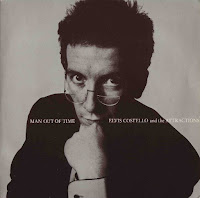"A stately arrangement full of elegant flourishes and studded with truly memorable detail encases Fry's courtly vocal and simply compels you to play it again and again. This record is going to number one. Not least because I have money on it."
— David Hepworth
— David Hepworth
What The Human League were to 1981, ABC were to '82: suddenly widely successful, flourishing creatively with a terrific album stuffed with potential hit singles, making inroads around the world and tipped to be the future of British pop. Beyond asking them, there's no way of knowing if they modelled their pathway to success after ver League but there certainly are striking similarities. Both got things started with nice, low-key singles that proved to be a breakthrough while still missing out on the Top 10 — "The Sound of the Crowd" and "Tears Are Not Enough" respectively — which they then followed up with improved chart fortunes that really got the momentum going — "Love Action (I Believe in Love)" and "Open Your Heart" from ver League, "Poison Arrow" and "The Look of Love" from ver "C" — before finally releasing albums that sold like mad and were salivated over by the critics — Dare and The Lexicon of Love. All that was left was a killer single to take them over the top: "Don't You Want Me" performed the trick less than a year earlier and now it was "All of My Heart"'s turn.
But did it stand much of a chance? A clear standout on an outstanding album, it nevertheless lacks the immediacy of its chart predecessors - not to mention non-single album tracks "Show Me" and "Many Happy Returns". Being as grand a record as they'd ever cut, however, it couldn't not be a single. Fans who'd only previously been exposed to their hits may have looked on in wonder at this great leap forward while other may well have been turned off by the pretentiousness of the single's cover, its B-side being a classical overture of their work, the adult nature of the video and the image of them on the cover of this fortnight's Smash Hits. It's possible, in other words, that they were attracting new listeners just as others were starting to go off them.
Musically it's as magnificent as David Hepworth says and proof that Trevor Horn's work behind the production desk involved far more than plugging in the fairlight synthesizers. Roping in Anne Dudley to orchestrate its gorgeous score was a final touch. Lyrically, however, things are a different matter. Far from the kind of Costello/Weller-type wordsmith, Martin Fry tended to keep things simple, though sometimes in a complicated way. Opening with "Once upon a time when we were friends / I gave you my heart, the story ends / No happy ever after, now we're friends" made me wonder at first if he really thought things through. Then, after several listens, I began to think that he was righter even than he lets on. Settling for friendship when one party clearly wants more never works out, despite what an endless parade of rom coms will have us believe. "All of My Heart" is about laying it out on the line for that special someone, being rejected and then trying again. There's a desperation at play that results in an over-abundance of clichés ("wish upon a star", "...at the end of the rainbow") while being resigned to a situation that will never work out ("Skip the hearts and flowers, skip the ivory towers"). Fry's vocalising deftly balances the melodrama and the nihilism in a way few of his contemporaries could ever think to pull off.
In the end, "All of My Heart" was a Top 5 hit but it came short of the top of the charts, with Hepworth having lost a few quid along the way. Getting there instead was fellow reviewee "Do You Really Want to Hurt Me" ("A hit, quite possibly," concludes His Nibs) by Culture Club, another group who were looking to become widely successful, flourish creatively, make inroads abroad and become yet another future of British pop. 1982 had to give way to '83.
~~~~~
Also Reviewed This Fortnight
Grandmaster Flash & The Furious Five: "The Message"
"Rap has a message," I'd often hear schoolmates say with a condescension that never failed to get under my skin — and I'm sure that's precisely what they were going for. Quite what that message supposedly is no one ever bothered to elaborate on. Maybe Grandmaster Flash can provide The Answer. It seems life is pretty damn hard, loaded with injustice, petty crime and poverty. Good, well done. I always felt that blues, folk, punk, reggae and soul artists had all been avoiding these hard hitting issues, so it's a credit to rappers that they were finally being tackled. I'm always suspicious of pop songs that are praised mostly for their importance and influence but there's not much to say about its quality. Though by all means opt for "The Message" if you believe that rap has a message; I like my hip hop futuristic and mind-expanding so I'll have me some "Planet Rock" by Afrika Bambaataa instead.








